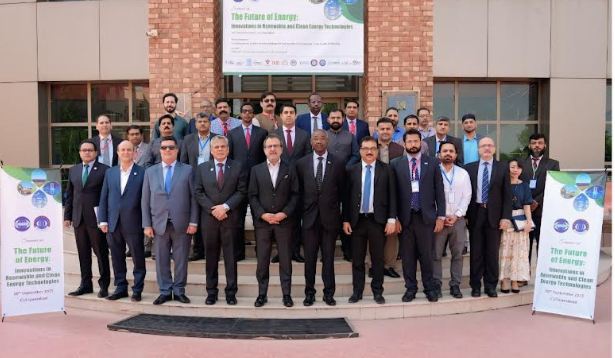ISLAMABAD, SEPT 30 /DNA/ – The Commission on Science and Technology for Sustainable Development in the South (COMSATS), in collaboration with a number of national and international partner organizations, held international Seminar on The Future of Energy: Innovations in Renewable and Clean Energy Technologies.H.E. Sardar Awais Ahmed Khan Leghari, Federal Minister for Energy, Government of Pakistan, graced the inaugural ceremony of the event,as Chief Guest, held at COMSATS University Islamabad (CUI).Ambassadors and diplomats of Palestine, Philippines, Somalia, Syria, Sudan, and Zimbabwe also attended the inauguration.
The Federal Minister noted that although Pakistan contributes less than 1% of global emissions, it ranks among the most climate-vulnerable nations. “Harnessing our abundant solar, wind, and hydro potential is a national priority for energy self-sufficiency and sustainability,” he said. He outlined the Government’s reforms, including stronger governance through independent boards in distribution companies, steps toward privatization for efficiency, and digitization with smart and advanced metering.
He added that infrastructure alone is not enough; smart solutions, advanced forecasting, storage, and digital integration are also required. To this end, the Power Planning and Monitoring Company (PPMC) has been established to support evidence-based decision-making. Pakistan is committed to deriving 60% of its electricity from clean and renewable sources by 2030. He remarked: “our grid carries 2,000 MW of wind, 800 MW of solar, and over 10,000 MW of hydropower. Distributed generation, particularly net metering, adds nearly 7,000 MW more, underscoring our steady transition to a sustainable energy future.”
Heexpressed gratitude to the Executive Director COMSATS, Ambassador Dr. M. Nafees Zakaria, the Rector CUI, Prof. Dr. Sajid Qamar, and all of the collaborating institutions for organizing the event bringing together a diverse and distinguished audience. He commended COMSATS’ initiatives and reaffirmed the Government of Pakistan’s full support for the organization’s mission.
The Executive Director COMSATS highlighted that 15 collaborators from COMSATS Member states and International Partner organizations was a manifestation of the importance attached to Renewable Energy Technologies. He viewed energy security as a cornerstone of sustainable development and therefore called for ensuring access to reliable, affordable, and clean energy, as enshrined in SDG-7, He considered it essential to integrate digital technologies in energy systems. Ambassador Zakaria highlighted COMSATS’ initiatives to promote clean energy, particularly the development of indigenous Electric Vehicle (EV). He proudly shared that COMSATS Tech Partner has developed EV technology indigenously.
Prof. Seyed Komail Tayebi, President ECO Science Foundation, Prof. Liu Weidong, Executive Director ANSO, and Prof. Dr. Junaid Mughal, COMSATS University Islamabad delivered remarks during the inaugural session. They highlighted the significance of renewable and clean energy technologies and expressed pleasure on this collaboration. ED ANSO highlighted the ongoing activities of his organization, including scholarships, fellowships, collaborative R&D sand capacity building. He informed that ANSO is promoting international cooperation in S&T with support of its 78 member institutions. He noted that ANSO and COMSATS have common mandate and therefore unlimited opportunities of cooperation. He appreciated COMSATS programs and initiatives.
The seminar included four technical sessions during which 15 speakers from China, Iran, Morocco, Pakistan, Sri Lanka, Syria, Turkiye, and USA delivered talks on latest trends and futuristic technologies in renewable and clean energy, integration of digital technologies in energy systems, and policy interventions to promote clean energy adoption. They explore cutting-edge topics, inter alia, related to solar power, wind energy, biofuels, tidal energy, energy storage breakthroughs, and AI-driven energy systems and smart grids.
The event attracted over 70 in-person and 80 online participants. These included scientists, researchers, policy makers, faculty members and students from Bangladesh, China, Indonesia, Jamaica, Morocco, Nigeria, Pakistan, Palestine, Sri Lanka, Sudan, Syria, Türkiye, United States, and Zimbabwe.

















